Blog

What We Learned at COP28
Phipps’ dedication to sustainability and climate action earned the Conservatory access to the Blue Zone in this year’s UN Climate Change Conference (UNFCCC COP28). These badges allow attendees access to the negotiation rooms as observers, providing opportunities to have influence the outcomes of the conference. The negotiation rooms are often full of representatives from different sectors, including senior leadership from NGOs, scientists and researchers, climate program managers and community leaders. This year, Phipps sent Youth Climate Advocacy Committee (YCAC) youth leader and University of Pittsburgh student Anna Bagwell, who joined the conversation with climate justice and youth involvement in mind. Realizing the crucial need to elevate and support youth voices, Phipps was proud to sponsor Anna and to have her accompanied by YCAC Coordinator Jennifer Torrance.
“Our long days of never-ending negotiations, walking for miles, holding back frustration, drafting and re-drafting intervention speeches and text suggestions, and being inspired by all the incredible people who care so deeply about climate have come to a close. Finally, we’re home!”
Anna Bagwell and Jennifer Torrance have a lot to share about their experience at the rather dramatic COP28 in Dubai, UAE. Here are five things they learned:
1. It’s easy to become overwhelmed. COP is enormous and full of pavilions, side events, coordination meetings, policy briefings, press conferences, opportunities to speak or be filmed, actions (aka protests or demonstrations), networking events and more…on top of the negotiations!
When advising first time youth attendees, one returning delegate urged them to attend what they were genuinely interested in. It seems simple, but it runs counter to what many young attendees might think they are ”supposed” to do. There are hundreds of educational and networking opportunities at COP; some people don’t attend a single negotiation, and that’s OK! You get to decide what a meaningful COP experience looks like to you. The burden of climate change has certainly been unfairly placed onto younger generations, and youth delegates don't need to neglect their individual interests at COP in favor of intense negotiations. However, if you want to follow the negotiations and have an impact, there are many to choose from! Getting involved in an observer constituency, such as YOUNGO, the official children and youth constituency, can help you keep tabs on all the opportunities at COP and learn from people who have attended before.
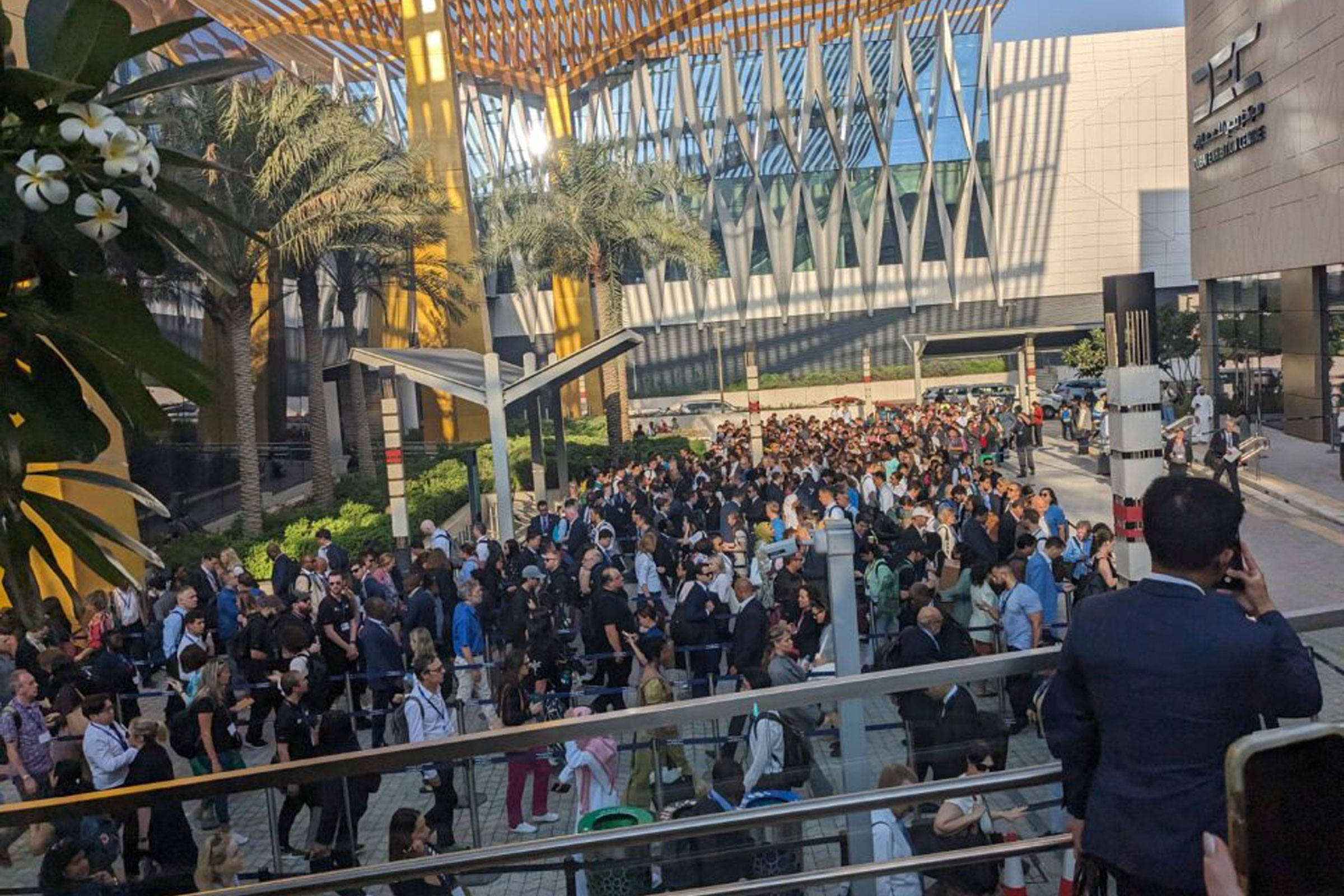 Long lines to get into COP
Long lines to get into COP
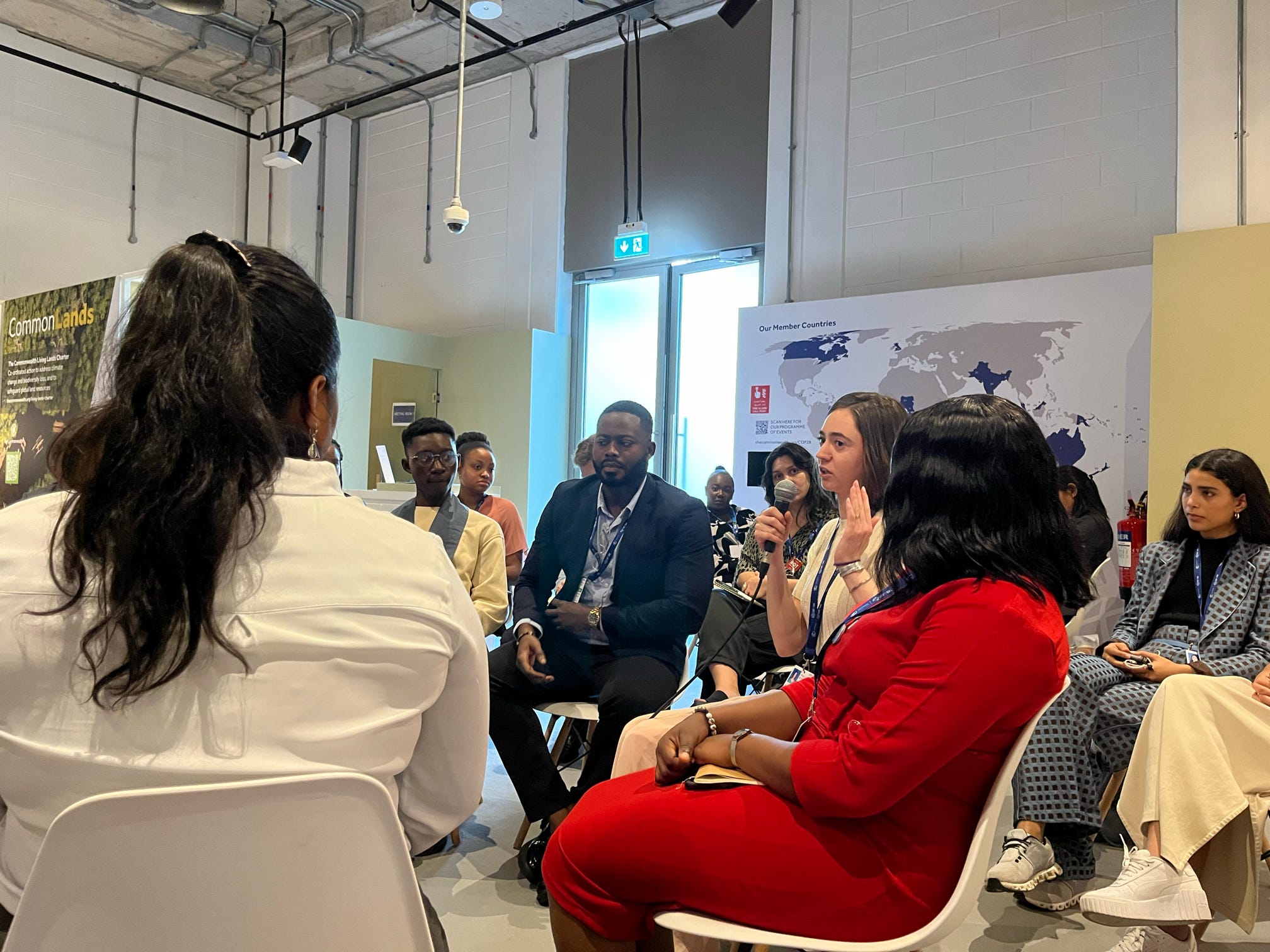
Discussion on green jobs and career training
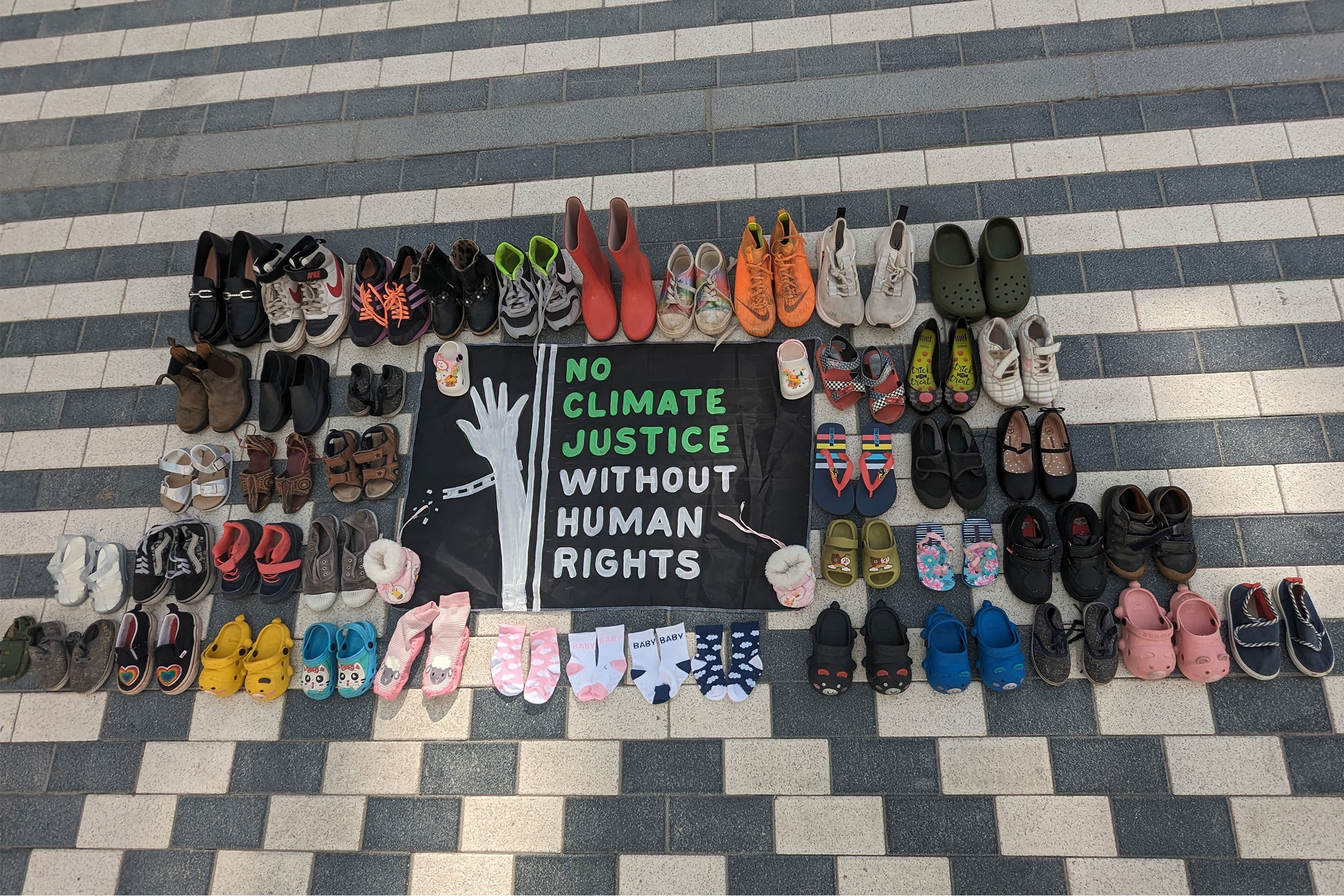
Demonstration on climate justice and human rights
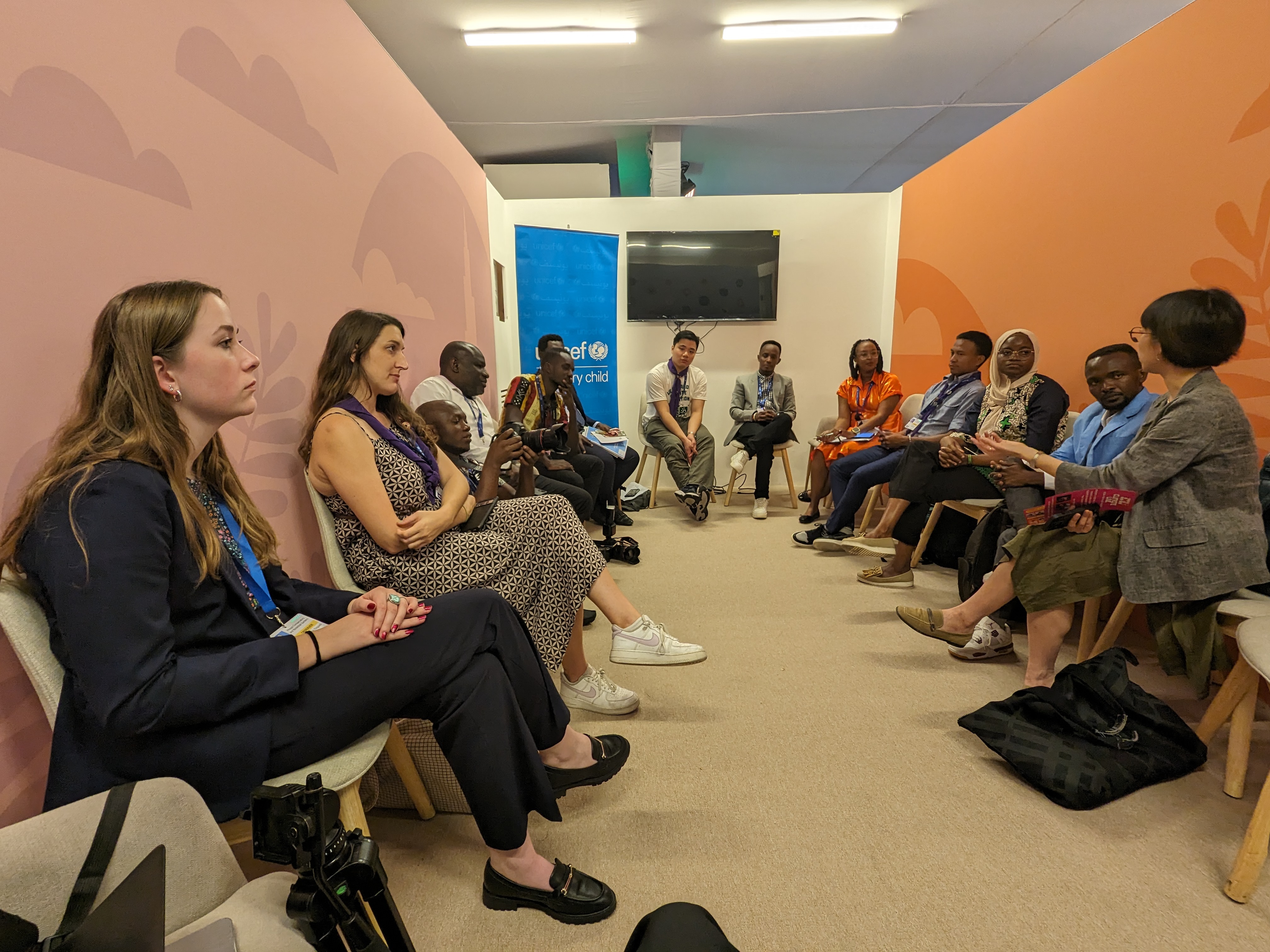
Roundtable discussion on the climate crisis as a child rights crisis
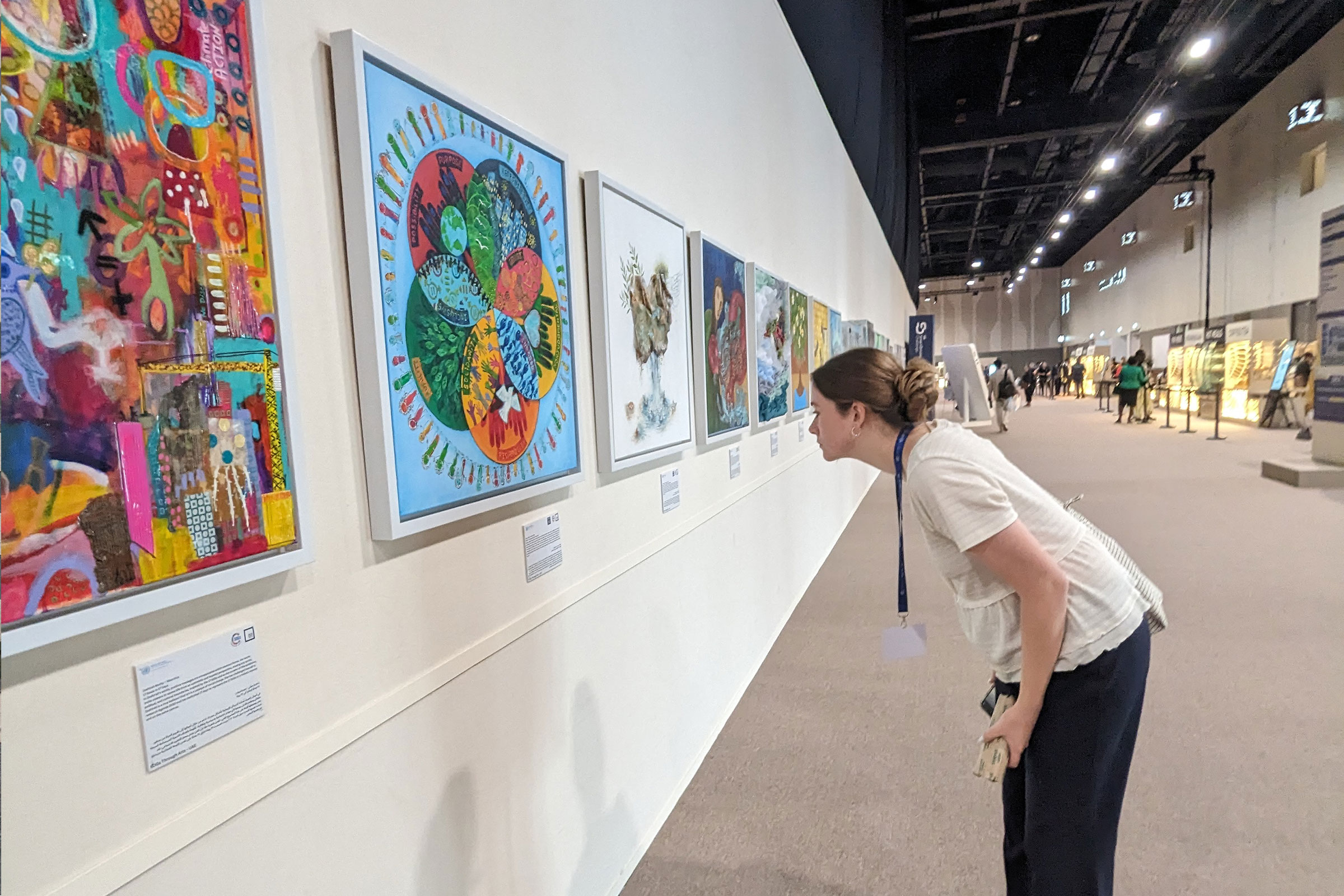
Climate art exhibit
2. Negotiations are long and grueling, often running twice or even three times as long as they are scheduled. Negotiators are people too, and long hours without sufficient breaks and food can have serious impacts on negotiations.
One negotiation we attended unexpectedly ran for six hours with only two short breaks! This causes high tensions among the negotiators. Negotiators work extremely hard to draft a text together, often having to balance the positions of their nations with the spirit of collaboration. If they are not able to cooperate, the negotiations do not advance. This unpredictable schedule can also disadvantage developing nations who often have smaller delegations. Negotiators cannot be everywhere at once, so they must prioritize overlapping agenda items when meetings run over time. One negotiation we attended ran three hours over time and some negotiators began leaving once we hit one hour over time. That’s two hours of negotiations they are not represented in because of scheduling issues.
Negotiators know a lot about policy — it's their job! — but they are people just like the rest of us. They get tired and hungry, and they need breaks to do their best work. They get frustrated with each other and with the lack of progress. They get overwhelmed with media, lobbyists and activists bombarding them. They feel a lot of pressure and are working long hours to represent an entire nation or group of nations in the negotiations. (And we learned that sometimes they may not even represent their own nation! We met someone from the U.S. who served as a representative when Fiji did not have anyone to speak.) We even saw one party delegate trying to boost morale by sneaking around a particularly tough negotiation to give out mini cupcakes! They really appreciate it when you thank them for working so hard.
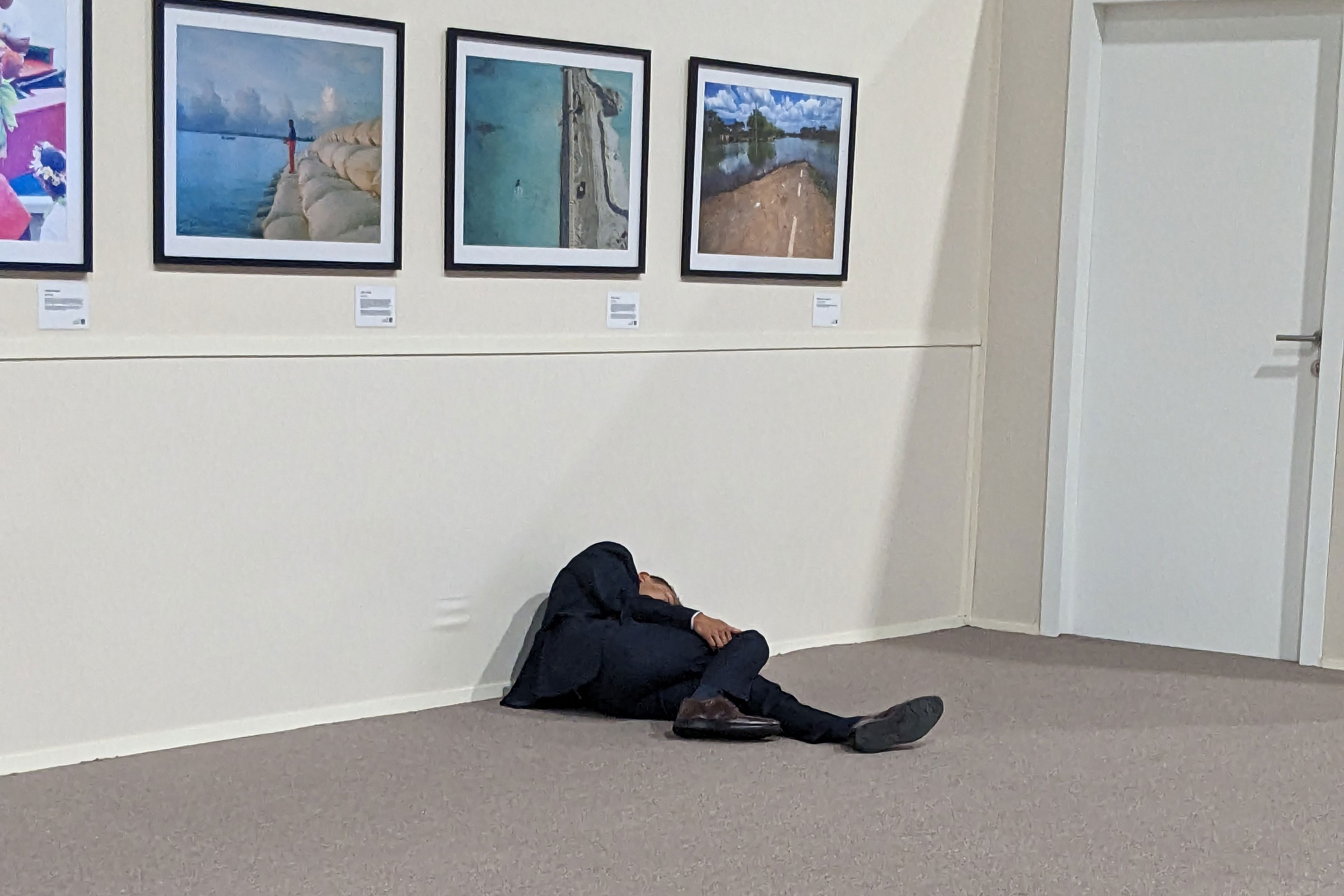
Delegate resting between negotiations
3. Observers need to be strategic when trying to influence negotiations, as they will face a lot of obstacles.
COP negotiations are a Party-driven process. Party members, or the people chosen to represent and negotiate on behalf of a nation, get priority both in seating and speaking opportunities. Observers are there to observe, but there are still ways to participate! Learning the types of negotiation meetings and whether or not you’re allowed in is the first obstacle. Finding negotiators outside of meeting rooms is a great way to introduce concerns, especially if you are a constituent of the nation they represent. This is the most confrontational method, so it’s important to be courteous of their time and their hard work. Being kind to negotiators, even if you disagree with their positions, is both necessary and strategic. It helps build trust and strengthen relationships between nations and observer constituencies, which then gives observers more influence over the negotiations. Observers and party negotiators can also set up bilateral meetings to meet more formally on specific issues or negotiations. Presenting negotiators with prewritten drafts also helps your chances of including desired language. They have a lot going on, so lightening the load with drafts makes their job easier.
If there is time at the end of negotiations, observer constituencies may have the chance to give a brief intervention speech. This is where observers can promote the issues that are important to them. For example, the intervention can show support for the proposed text, insist on different language or push for an item to be discussed more thoroughly. Being involved in an observer constituency, especially a working group specifically about that negotiation topic, can give you opportunities to help draft interventions or even deliver the speech. For example, we worked on interventions for YOUNGO, the official youth and children constituency, in the Action for Climate Empowerment negotiations.
Nations often decide their positions on the issues at COP months in advance, so if you want to impact your own government, do it before September! And COP isn’t the only conference to be aware of: The SBI, which focuses on the implementation of climate policies and actions, and the SBSTA, which provides scientific and technological advice, meet twice a year at COP and at the Bonn Climate Change Conference. Reaching out to your government before the Bonn Conference in June can also have a great impact since this is where many proceedings for the next COP are decided.
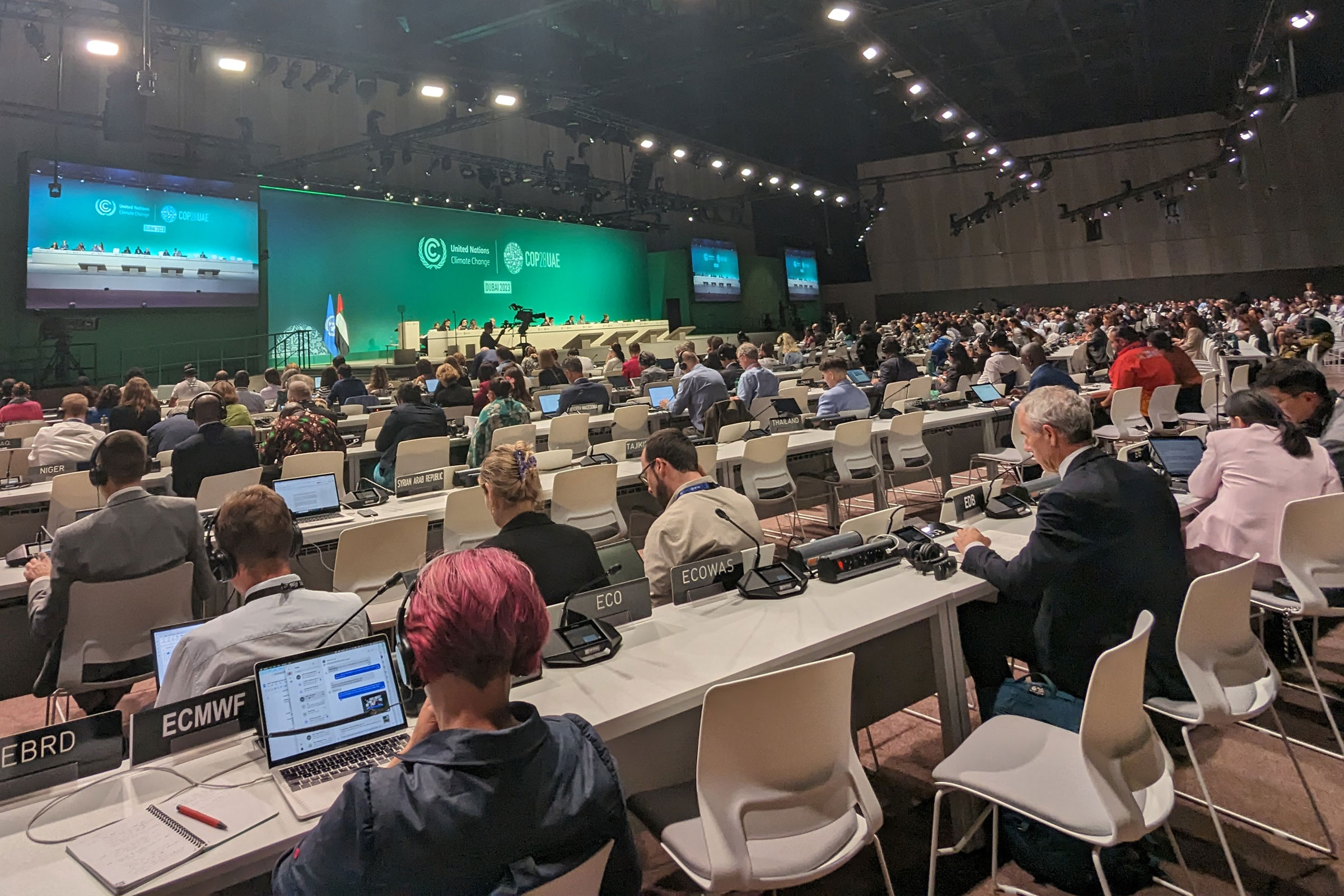
Joint Plenary Meeting of the SBSTA and SBI
4. COP is equal parts inspiring and disheartening.
When surrounded by other people who are as passionate as you about climate action, you can’t help but feel inspired! At the same time, coming to a climate conference hosted by the head of an oil company, it was impossible not to feel disheartened. Each day was a mix of wonder at the thousands of people who care enough to travel across the world to attend a climate conference and frustration at the 2,400+ of them who were fossil fuel lobbyists. The negotiations were the same way: we’d see amazing nations like Colombia pushing for climate action and justice, and we’d also see other nations, including our own, rewording language to be vague and blocking advancements in the text. (Check out Climate Network's The Fossil of the Day awards to see which countries were celebrated and which were called out for blocking progress at COP.)
Throughout COP28, conversations occurred that highlighted youth's increasing impatience with “youth-washing,” the tokenization of youth involvement as a stand-in for meaningful inclusion and action. But with all of the attention youth climate activists have garnered, it is getting better! We’ve proven ourselves to be capable, knowledgeable and unrelenting. We’re not afraid to call out injustice and trickery. We’re fierce allies of the most affected nations and those who are calling for ambitious climate action. Being surrounded and uplifted by other young people and supporters was incredibly inspiring, just as the progress on the work we’re fighting for was equally disheartening.
Being part of demonstrations was a cathartic experience for us. We were nervous about protesting in Dubai because demonstrations are usually illegal, but we were protected by the rules of the United Nations. So on our last day at COP, we took a stand. It felt both heavy and empowering to stand with a group of other young people, especially people from the global south who have experienced climate disaster firsthand, and make our voices heard. People shared stories that brought tears to our eyes and stories that made us yell and chant. The mix of sadness for those who lost everything, anger at the injustice of it all, and pride and strength in standing up for our planet and our futures with a group of other caring people was enormous.
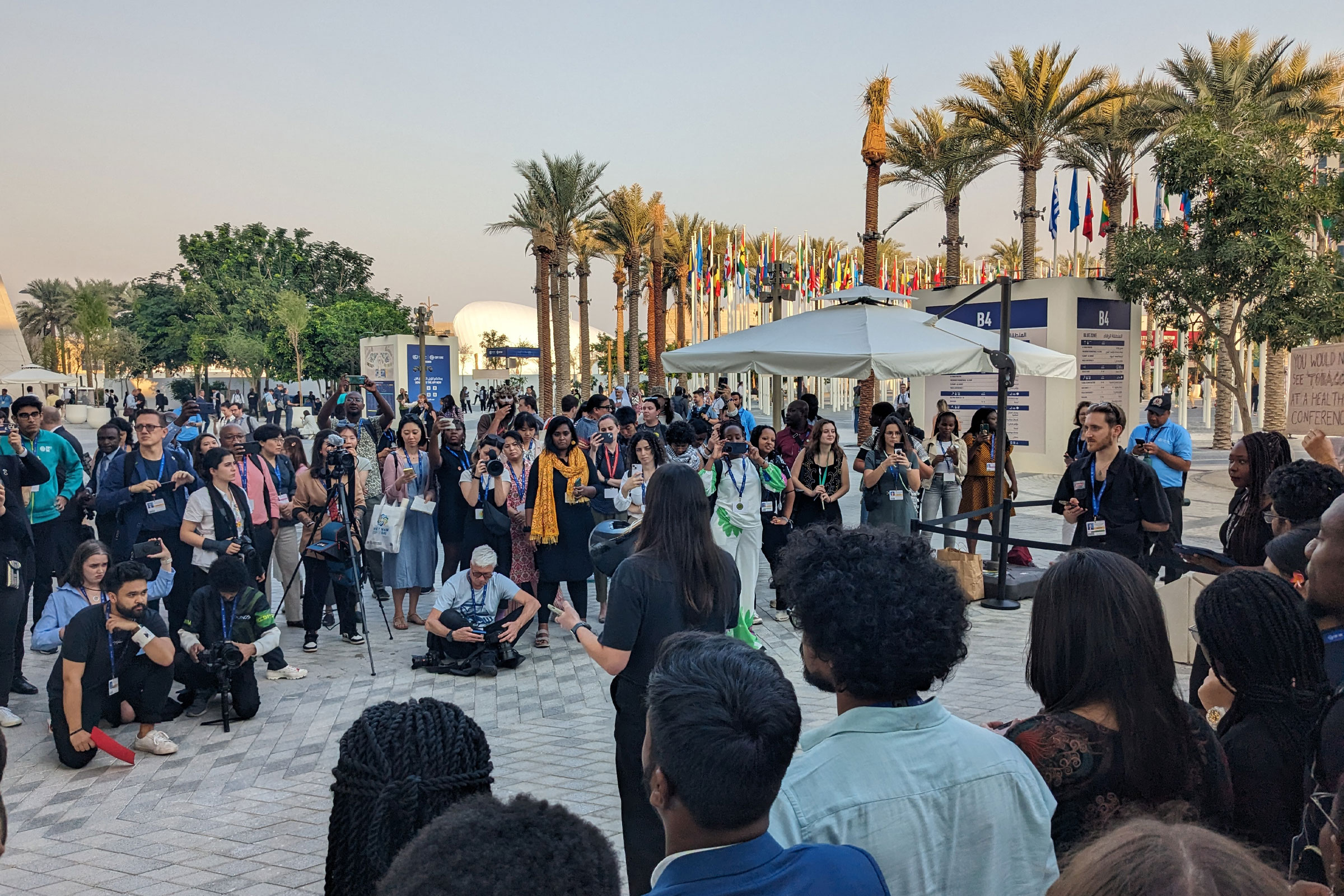
Demonstration on "youth-washing" and conflict of interest
5. You’ll meet a lot of amazing people who care so much!
We met people from all over the world who work in a variety of sectors and it’s extremely encouraging to see genuine care from such a broad range of delegates. Attending the YOUNGO Spokes coordination meetings every morning was one of the highlights of our experience at COP. YOUNGO is for anyone under the age of 35 and we met people as young as 11! The meetings grounded us, gave us a sense of purpose and avenues for action, and allowed us time to connect with and befriend other youth from around the world. We ended each meeting with an excellent morale booster: singing a climate action parody of “I Want It That Way” by the Backstreet Boys (“we need / mitigation / we call / for adaptation.”) It was these moments of collective joy that really pulled us through.
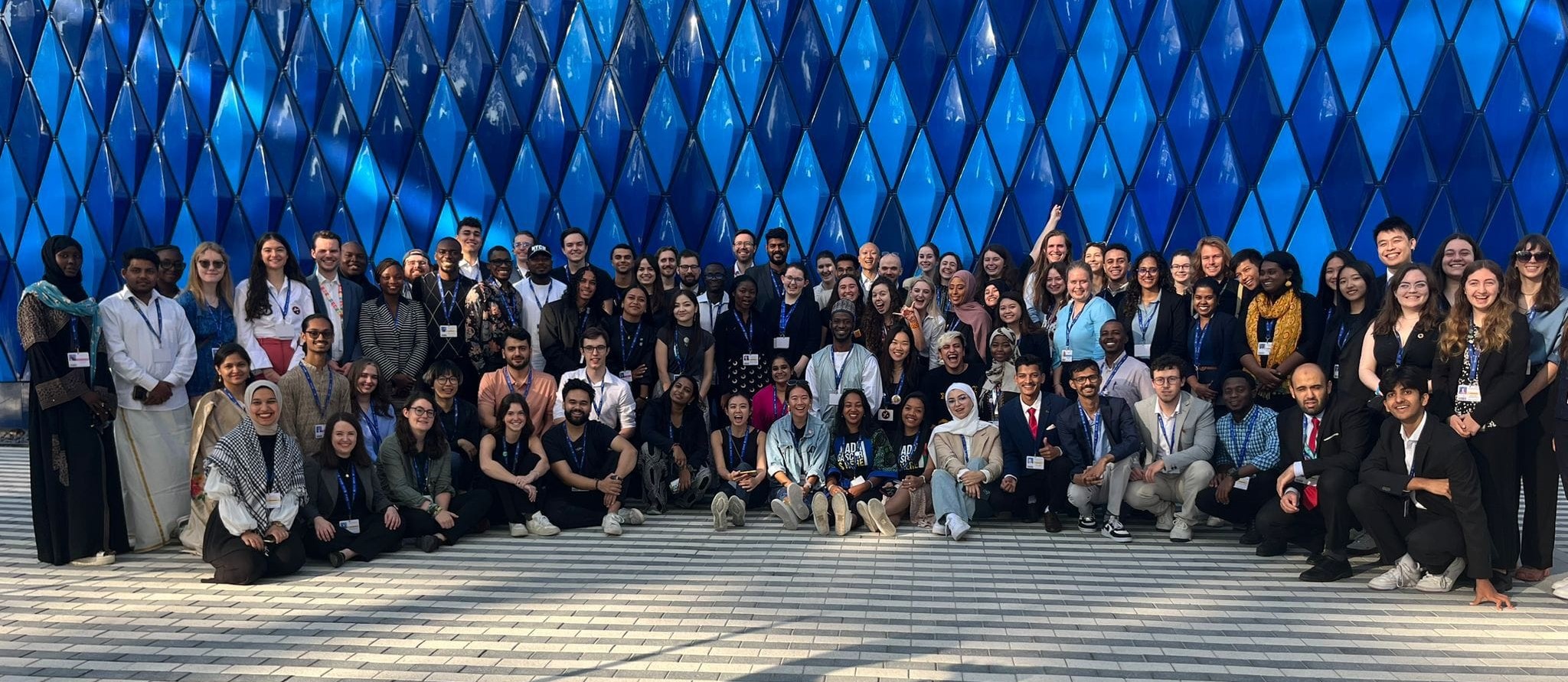
Youth at COP28
The people you meet along the way are the true gems of the COP experience. If we could offer only one piece of advice, it would be to get involved in an observer constituency that is the best fit for you. Some of them have links where anyone who qualifies can join, and you can join other constituencies through one of the organizations associated with them. The UNFCCC puts out a list of admitted NGOs including their constituencies, so you can see which organizations in your area are part of your desired constituency. Phipps Conservatory is part of Environmental NGOs (ENGO), but many of us in the Youth Climate Advocacy Committee are also part of YOUNGO. Observer constituencies provide many opportunities to contribute to the UNFCCC processes both at COP and throughout the year. Most importantly, observer constituencies offer a place to have your voice heard, see your ideas represented, learn from the experiences of others and build a strong community with other like-minded climate advocates.
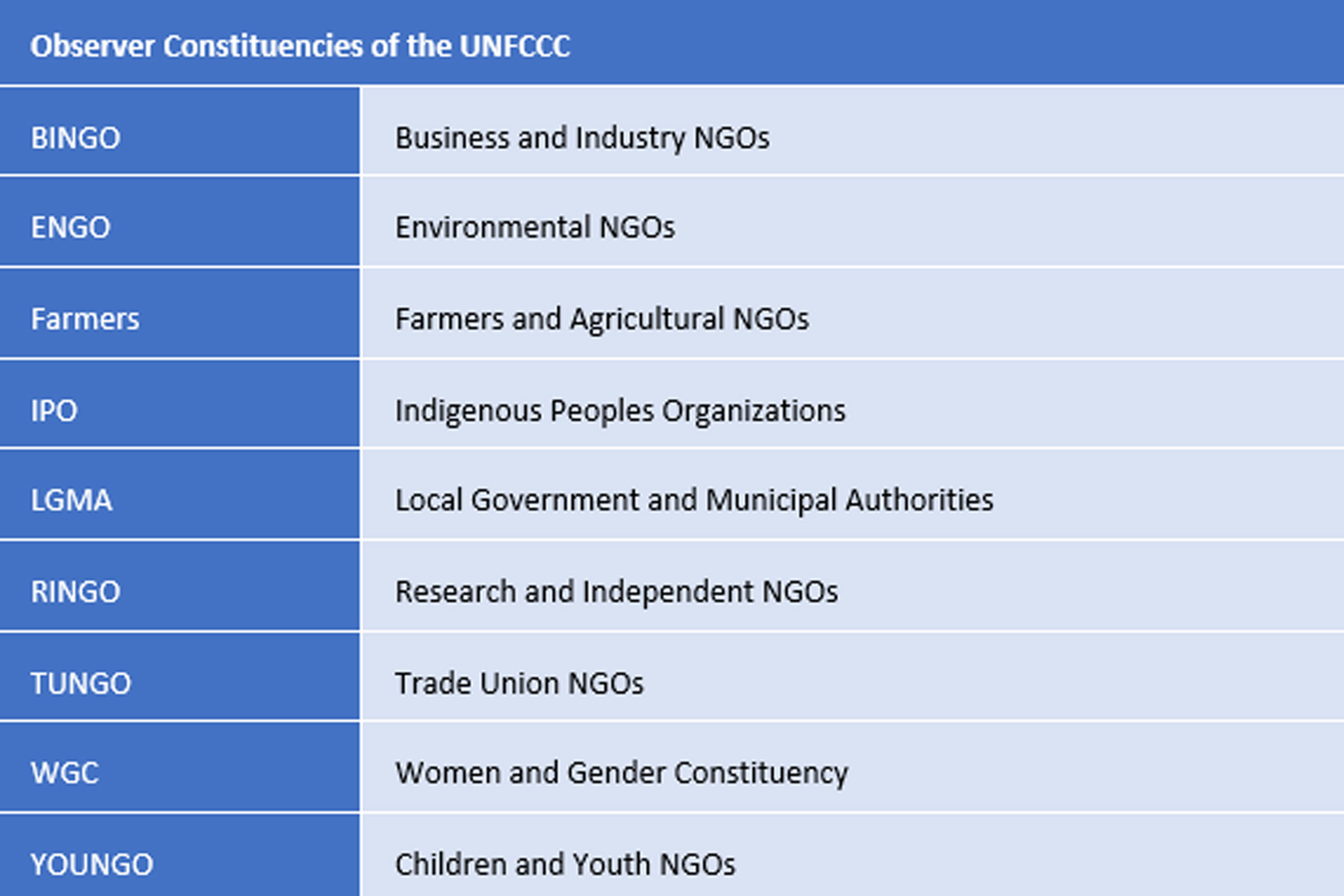
The nine constituencies are: Business and industry NGOs (BINGO), Environmental NGOs (ENGO), Farmers, Indigenous peoples organizations (IPO), Local government and municipal authorities (LGMA), Research and independent NGOs (RINGO), Trade union NGOs (TUNGO), Women and Gender (WGC), and Children and Youth NGOs (YOUNGO).

